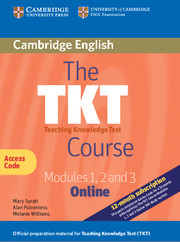Book contents
- Frontmatter
- Contents
- Introduction
- Tips for preparing for the TKT
- Module 1 Language and background to language learning and teaching
- Part 1 Describing language and language skills
- Part 2 Background to language learning
- Unit 9 Motivation
- Unit 10 Exposure and focus on form
- Unit 11 The role of error
- Unit 12 Differences between L1 and L2 learning
- Unit 13 Learner characteristics
- Unit 14 Learner needs
- Unit 15 Approaches to language teaching
- Part 3 Background to language teaching
- Module 2 Lesson planning and use of resources for language teaching
- Part 1 Planning and preparing a lesson or sequence of lessons
- Part 2 Selection and use of resources
- Module 3 Managing the teaching and learning process
- Part 1 Teachers' and learners' language in the classroom
- Part 2 Classroom management
- Sample TKT answer sheet
- Exam tips for the TKT
- Answer key for Follow-up activities
- Answer key for TKT practice tasks
- Answer key for TKT practice tests
- Alphabetical list of glossary terms
- Unit-by-unit list of glossary terms
- Acknowledgements
Unit 11 - The role of error
Published online by Cambridge University Press: 05 November 2012
- Frontmatter
- Contents
- Introduction
- Tips for preparing for the TKT
- Module 1 Language and background to language learning and teaching
- Part 1 Describing language and language skills
- Part 2 Background to language learning
- Unit 9 Motivation
- Unit 10 Exposure and focus on form
- Unit 11 The role of error
- Unit 12 Differences between L1 and L2 learning
- Unit 13 Learner characteristics
- Unit 14 Learner needs
- Unit 15 Approaches to language teaching
- Part 3 Background to language teaching
- Module 2 Lesson planning and use of resources for language teaching
- Part 1 Planning and preparing a lesson or sequence of lessons
- Part 2 Selection and use of resources
- Module 3 Managing the teaching and learning process
- Part 1 Teachers' and learners' language in the classroom
- Part 2 Classroom management
- Sample TKT answer sheet
- Exam tips for the TKT
- Answer key for Follow-up activities
- Answer key for TKT practice tasks
- Answer key for TKT practice tests
- Alphabetical list of glossary terms
- Unit-by-unit list of glossary terms
- Acknowledgements
Summary
What is the role of error?
Making mistakes plays an important and useful part in language learning because it allows learners to experiment with language and measure their success in communicating. This unit focuses on the kinds of mistakes learners make when they speak or write a foreign language, why they make these mistakes and the part that mistakes play in language learning.
Key concepts
What are the main reasons why your learners make mistakes?
Mistakes are often categorised into errors and slips. Errors occur when learners try to say something that is beyond their current level of knowledge or language processing (working on the language unconsciously to try to understand and learn it). Usually, because they are still processing or don't know this part of the language, learners cannot correct errors themselves because they don't understand what is wrong.
Slips are the result of tiredness, worry or other temporary emotions or circumstances. We make them because we are not concentrating on what we are saying or writing. They are not a result of incomplete language processing or a lack of knowledge. They happen simply because our attention is somewhere else at that moment. These kinds of mistakes can be corrected by learners themselves, once they realise they have made them.
There are two main reasons why second language learners make errors. The first reason is influence from the learner's first language (mother tongue/L1) on the second language (L2). This is called interference or transfer. Learners may use sound patterns, lexis or grammatical structures from their own language in English.
- Type
- Chapter
- Information
- The TKT Course Modules 1, 2 and 3 , pp. 62 - 66Publisher: Cambridge University PressPrint publication year: 2011



